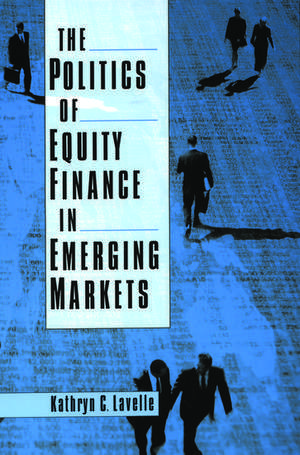The Politics of Equity Finance in Emerging Markets
Autor Kathryn C. Lavelleen Limba Engleză Paperback – 11 noi 2004
| Toate formatele și edițiile | Preț | Express |
|---|---|---|
| Paperback (1) | 447.98 lei 31-37 zile | |
| Oxford University Press – 11 noi 2004 | 447.98 lei 31-37 zile | |
| Hardback (1) | 642.67 lei 31-37 zile | |
| Oxford University Press – 11 noi 2004 | 642.67 lei 31-37 zile |
Preț: 447.98 lei
Preț vechi: 552.25 lei
-19% Nou
Puncte Express: 672
Preț estimativ în valută:
85.72€ • 89.73$ • 71.35£
85.72€ • 89.73$ • 71.35£
Carte tipărită la comandă
Livrare economică 21-27 martie
Preluare comenzi: 021 569.72.76
Specificații
ISBN-13: 9780195174106
ISBN-10: 0195174100
Pagini: 296
Ilustrații: 7 figures and numerous tables
Dimensiuni: 231 x 155 x 10 mm
Greutate: 0.42 kg
Editura: Oxford University Press
Colecția OUP USA
Locul publicării:New York, United States
ISBN-10: 0195174100
Pagini: 296
Ilustrații: 7 figures and numerous tables
Dimensiuni: 231 x 155 x 10 mm
Greutate: 0.42 kg
Editura: Oxford University Press
Colecția OUP USA
Locul publicării:New York, United States
Recenzii
Kathryn Lavelle explains in clear, succinct terms how national political processes lead to equity market growth, and how that growth affects the process of corporate governance - and why it sometimes fails to do so as governments maintain a continuing grip of firms (especially those formerly state-owned). She links this discussion - through case studies focusing on Eastern Europe, Asia, Latin America and Africa - to cross-border equity flows and global capital markets, and to the role of international development organizations. The discussion covers the appearance of new financial products and new kinds of financial intermediaries in emerging markets, notably viable equity markets. Much of the discussion provides good news, although there are plenty of shadows involving missed opportunities and he potential for economic contamination through volatile cross-border capital flowsIR.










